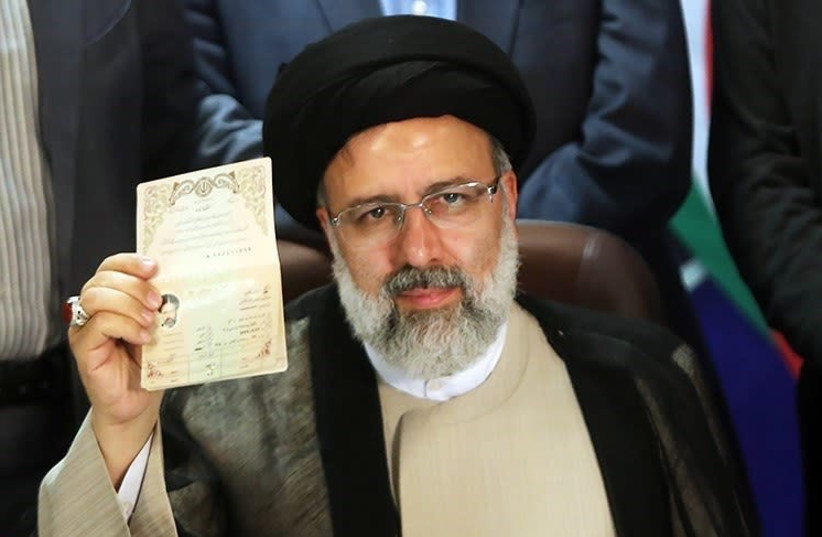With incoming president Ebrahim Raisi taking power later this week, US diplomats are worried about the future of Iran Deal negotiations.
YONAH JEREMY BOB
AUGUST 2, 2021 06:18

America’s top envoy for the nuclear negotiations with Iran, Rob Malley, is having increasing doubts about whether a return to the 2015 JCPOA agreement is possible, The New York Times reported Saturday.
“There’s a real risk here that they come back with unrealistic demands about what they can achieve in these talks,” he said in an interview with the Times, referring to President-elect Ebrahim Raisi taking power later this week.
A major concern since Iran froze out IAEA inspectors on May 24, and the negotiations mostly broke down shortly thereafter, has been the experience and scientific knowledge Tehran is achieving by continuing to enrich uranium at the 60% level and by continued use of advanced centrifuges such as the IR-4 and IR-6.
cnxps.cmd.push(function () { cnxps({ playerId: ’36af7c51-0caf-4741-9824-2c941fc6c17b’ }).render(‘4c4d856e0e6f4e3d808bbc1715e132f6’); });
According to the JCPOA, Iran was limited to enriching to 5% with at most a few dozen advanced centrifuges.
The 60% enrichment level is two jumps up from the 5% level and considered only one step below the 90% weaponized level.
Running hundreds of IR-4s and IR-6s is considered a major achievement that can allow Tehran to conceive of a more industrial-scale program that could eventually enrich sufficient uranium for a nuclear bomb within weeks.
Relating to Iran’s new achievements and whether the newly gained knowledge could make the JCPOA obsolete, Malley told the Times: “At that point, we will have to reassess the way forward; we hope it doesn’t come to that.”
One battle between Iran and the US has been the terms of what comes after a return to the JCPOA.
Tehran wants to hamstring Washington from being able to easily snap back sanctions on the regime by getting a guarantee that the Biden administration will not unilaterally pull out and potentially even guarantee that it will remain in force beyond the end of Biden’s January 2025 first term.
However, Malley and US Secretary of State Antony Blinken have said there is no way to tie the hands of a future president in a democracy and that the best tactic for preserving an agreement is to demonstrate that it works for all of the parties involved.
“There is no such thing as a guarantee; that’s not in the nature of diplomacy… But we don’t have any intent – the president doesn’t have any intent – of spending all these months negotiating a return to the deal in order to then withdraw,” Malley said.
The Biden administration may start to explore alternate paths to a straight return to the JCPOA, the Times reported.
IN MID-MAY, The Jerusalem Post was the first to report on the new book Iran’s Perilous Pursuit of Nuclear Weapons by Institute for Science and International Security president David Albright and researcher Sarah Burkhard.
“The most straightforward way to dramatically reduce Iran’s prospects of building nuclear weapons is to focus on the nuclear explosive production and nuclear weaponization pillars,” Albright wrote.
Albright’s strategy would break with the JCPOA in light of developments since 2015, but it would provide an alternate way to monitor and prevent Iran from getting a nuclear weapon.
Part of the reason that the focus should shift to IAEA inspections of weaponization, Albright wrote, is because realistically, “The elimination of the [nuclear] delivery system pillar is more difficult to thwart because Iran has so many options for delivering nuclear weapons, ranging from ballistic missiles to cruise missiles to ships.”
“Negotiations should aim to limit ballistic missiles, but it should be recognized that eliminating this pillar in its entirety is impossible” given years of Western complacency and Iranian progress on the issue, he wrote.
Conventionally, the fight over US policy toward Iran divides into those who are for or against returning to the 2015 nuclear deal, including lifting Trump administration-era sanctions for Tehran returning to the deal’s nuclear limitations.
Although Albright has pointed out holes in the 2015 deal for years, he is also a realist.
Given the Biden administration’s posture, Albright explores how the US and other interested countries could try to head off Iran from getting a nuclear weapon even if some of its “nuclear pillars” are not blocked as much as he might hope.
Rather, he suggests, a major benefit of the 2018 Mossad raid on Tehran’s secret nuclear archive is that it gives the world powers much more insight into how to supervise and block Iran’s weaponization of the nuclear program.
OF COURSE, this would require a much more forceful approach by the IAEA and world powers in terms of resolving where each element of weaponization revealed by the archive is being stored and monitoring them all.
In some ways, this would in and of itself be a game-changing approach. But Albright suggests it could be palatable given the new information and the idea that the elements being monitored have no justification except for weaponization.
He cites three items the IAEA would need to explore and monitor regarding Iran’s efforts.
One would be Tehran’s “maintaining the capability to use computer codes to simulate the explosion of a nuclear weapon. Greater use of simulations would make component testing less necessary.”
A second would be “retaining a mastery of the multipoint initiation system, e.g., the shock wave generator, including possibly having conducted a successful ‘cold test’ of a nuclear explosive with a surrogate nuclear core.”
The third would be “having the capability to make the neutron initiator.”
All three of these elements, if not policed by the IAEA, could help Tehran move much more swiftly to be able to explode the uranium it enriches for a nuclear bomb.
In contrast, if the IAEA gains new inspection powers over these elements that were exposed by the Mossad, Iran could be prevented from developing a nuclear weapon despite other major holes in the 2015 nuclear deal.
Content retrieved from: https://www.jpost.com/middle-east/iran-news/top-us-iran-envoy-having-doubts-about-nuke-deal-675519.